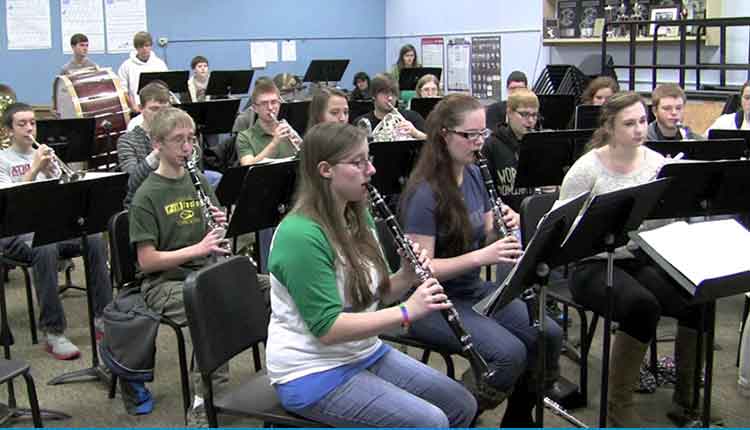Every block of stone has a statue inside it and it is the task of the sculptor to discover it.
Michelangelo
What if we approached our students from this perspective? We wouldn’t think of comparing one child to another. Instead, our chief goal would be to extricate the unique brilliance and mastery of each student; discovering their potential and dedicating our efforts to their personal attainment of unbelievable possibilities.
In their bestselling book, The Art of Possibilities, authors Rosamund Stone Zander and Benjamin Zander present a fresh construct of thinking, particularly relevant to the classroom. They relate the experiment of “Giving an A,” to every student in the class, no longer as a means of measuring performance, but now allowing students to envision their own futures. The only requirement is that each student must write a postdated letter to the instructor explaining what will have happened to them by the following May, starting with the line, “I got my A because…” . In other words, they determine the result of their efforts from the vantage point of already achieving their goal.
We’ve all seen the value of setting goals. The art of possibilities expands the horizon still further by causing students (and anyone else willing to shift their thinking accordingly) to envision what it would look like for them to reach their goals. What awards would they receive? What milestones would they reach? Who will they have become?
How do we create an atmosphere in our rehearsals for this type of thinking? The extreme pressure to play better than the other trumpet players, or perform a field show perfectly, or to win a state competition, etc., all weigh heavily on our students; putting the focus on the negative (not making a mistake) and possibly even squelching creativity and passion. Some students do their best to adjust to the pressure while others, (many times the most committed) disengage and become cynical. Take away the power disparities, build a team atmosphere, and speak to their passion (not their cynicism) and you’ll transform even the disengaged into valuable members of your organization.
Create a rehearsal atmosphere conducive to unlimited possibilities
- Make it clear that the best from every student is necessary to reach your goals. Don’t just tell them. Show them. Shape every action and statement around this philosophy.
- Keep students engaged. Engaged students listen. They heed advice, value input and give you their best effort.
- Engaged students are involved students so keep them playing their instruments and/or marching as much as possible.
- Create a team atmosphere versus a hierarchy of ability levels.
- Give everyone an ‘A,’ from the onset, not as a measurement tool, but as a tool to open them up to possibilities.
- Create a risk-free atmosphere for students to excel and fail; an atmosphere where passion and risk-taking is celebrated. Instead of promoting competition, (which makes it nearly impossible to risk marring a perfect performance), call “mistakes” opportunities; an invitation to see what needs attention.
- Develop a mission statement for your group that staff and students can adopt and adhere to. Author, Wayne Markworth gives us an example in his textbook, The Dynamic Marching Band:
“Rehearsals will be conducted with a positive attitude in a pleasant atmosphere. Students will be focused, energetic and relaxed to achieve outstanding results. The director and staff will be organized and efficient, demonstrating careful planning and goal setting. These qualities will make the experience enjoyable and productive for students and staff.”
Create a grid of efficiency
- Demonstrate and reward good rehearsal etiquette.
- Begin and end on time.
- Come ready to instruct/play.
- Listen when the staff gives instruction
- Be willing to change the momentum or pacing of a rehearsal to gain better focus and participation
Careful planning and clear communication of expectations prior to every rehearsal prepares the way for staff and students alike to remain relaxed and fully engaged. The “rehearsal equals performance” mantra takes on new meaning when the freedom to relax and risk in the expression of passion becomes the norm, rather than the pressure of perfectionism normally associated with performance being carried into the rehearsal hall.
Maintaining a consistent warm-up regimen, which includes technique development, plays a key role in the efficiency of the rehearsal, not to mention the range and flexibility it makes available for the resulting performance.
Enjoy the music
From the first rehearsal, begin emphasizing the need for a balanced and blended sound. Focus the students’ attention on balance of the ensemble, supported by the bass voices. The key is listening. All players should be keeping an ear open for the bass voices and all of the “inside” parts of the ensemble.
Master the fundamentals in a variety of formats. These include singing, buzzing (for your brass players) and “air only” studies. When students are able to sing and buzz musical excerpts accurately, the clarity of both individual and ensemble tone improves multi-fold. This is a great way to teach your drill and music at the same time as well.
Teach what to listen for and how to maintain good intonation. Go around each section and have students play a simple four-note phrase and ask them if anyone in the section seems to be “out of tone.” Find the best sound and everyone match it.
Reinforce the need to keep impeccable time. Make sure the percussion beat can be heard from one end of the ensemble to the other. Again, train the group memebers to listen to one another.
Establish musical expectations:
Let them know they aren’t going to get away with sloppy attacks or anything else. If the first attack of the day was bad or tone quality was poor, stop and involve the students in fixing it.
Exercises should be played at all dynamic ranges and at a variety of tempi. A variety of note shapes and articulations need to be reinforced.
In all things, keep everyone involved in order to attain the optimal result. It will soon become apparent that, in order for them to fulfill their personal milestones, they will need to work together for the good of all. Band camp and rehearsals should be a laboratory of possibilities for a total and complete musical experience. Don’t limit your students or yourself…Give yourself an ‘A’!


